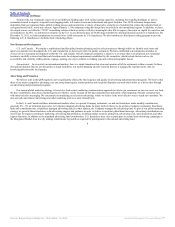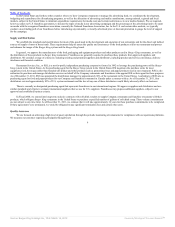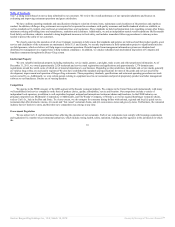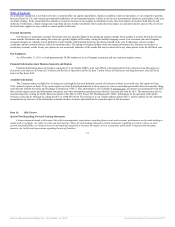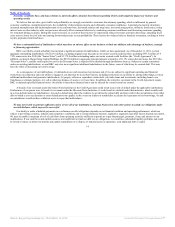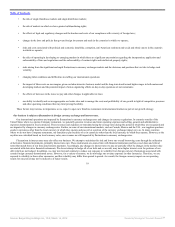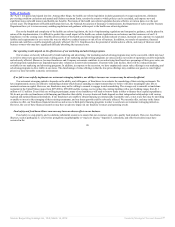Burger King 2011 Annual Report Download - page 19
Download and view the complete annual report
Please find page 19 of the 2011 Burger King annual report below. You can navigate through the pages in the report by either clicking on the pages listed below, or by using the keyword search tool below to find specific information within the annual report.
Table of Contents
• the risk of single franchisee markets and single distributor markets;
• the risk of markets in which we have granted subfranchising rights;
• the effects of legal and regulatory changes and the burdens and costs of our compliance with a variety of foreign laws;
• changes in the laws and policies that govern foreign investment and trade in the countries in which we operate;
• risks and costs associated with political and economic instability, corruption, anti-American sentiment and social and ethnic unrest in the countries
in which we operate;
• the risks of operating in developing or emerging markets in which there are significant uncertainties regarding the interpretation, application and
enforceability of laws and regulations and the enforceability of contract rights and intellectual property rights;
• risks arising from the significant and rapid fluctuations in currency exchange markets and the decisions and positions that we take to hedge such
volatility;
• changing labor conditions and difficulties in staffing our international operations;
• the impact of labor costs on our margins given our labor-intensive business model and the long-term trend toward higher wages in both mature and
developing markets and the potential impact of union organizing efforts on day-to-day operations of our restaurants;
• the effects of increases in the taxes we pay and other changes in applicable tax laws;
• our ability to identify and secure appropriate real estate sites and to manage the costs and profitability of our growth in light of competitive pressures
and other operating conditions that may limit pricing flexibility.
These factors may increase in importance as we expect to open new franchise restaurants in international markets as part of our growth strategy.
Our business is subject to fluctuations in foreign currency exchange and interest rates.
Our international operations are impacted by fluctuations in currency exchange rates and changes in currency regulations. In countries outside of the
United States where we operate Company restaurants, we generally generate revenues and incur operating expenses and selling, general and administrative
expenses denominated in local currencies. These revenues and expenses are translated using the average rates during the period in which they are recognized and
are impacted by changes in currency exchange rates. Further, in some of our international markets, such as Canada, Mexico and the U.K., our suppliers purchase
goods in currencies other than the local currency in which they operate and pass all or a portion of the currency exchange impact on to us. In many countries
where we do not have Company restaurants, our franchisees pay royalties to us in currencies other than the local currency in which they operate. However, as the
royalties are calculated based on local currency sales, our revenues are still impacted by fluctuations in currency exchange rates.
Fluctuations in interest rates may also affect our business. We attempt to minimize this risk and lower our overall borrowing costs through the utilization
of derivative financial instruments, primarily interest rate caps. These instruments are entered into with financial institutions and have reset dates and critical
terms that match those of our forecasted interest payments. Accordingly, any changes in interest rates we pay are partially offset by changes in the market value
associated with derivative financial instruments. We do not attempt to hedge all of our debt and, as a result, may incur higher interest costs for portions of our
debt which are not hedged. In addition, we enter into forward contracts to reduce our exposure to volatility from foreign currency fluctuations associated with
certain foreign currency-denominated assets. However, for a variety of reasons, we do not hedge our revenue exposure in other currencies. Therefore, we are
exposed to volatility in those other currencies, and this volatility may differ from period to period. As a result, the foreign currency impact on our operating
results for one period may not be indicative of future results.
18
Source: Burger King Holdings Inc, 10-K, March 14, 2012 Powered by Morningstar® Document Research℠


